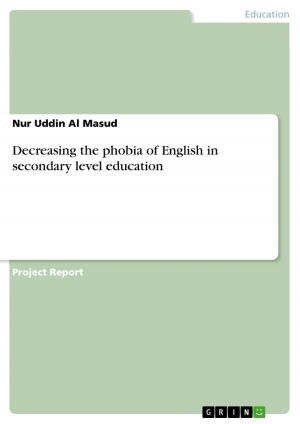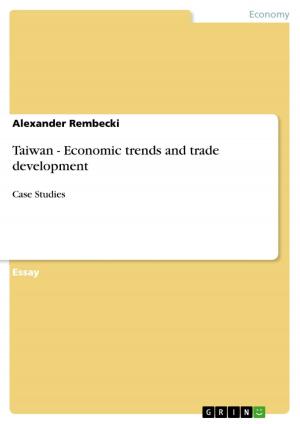Russia and its Changing Perceptions of the EU
Nonfiction, Social & Cultural Studies, Political Science| Author: | Michael Hofmann | ISBN: | 9783638551632 |
| Publisher: | GRIN Publishing | Publication: | October 4, 2006 |
| Imprint: | GRIN Publishing | Language: | English |
| Author: | Michael Hofmann |
| ISBN: | 9783638551632 |
| Publisher: | GRIN Publishing |
| Publication: | October 4, 2006 |
| Imprint: | GRIN Publishing |
| Language: | English |
Seminar paper from the year 2005 in the subject Politics - International Politics - Region: Russia, grade: 69 (upper second), University of Kent, 38 entries in the bibliography, language: English, abstract: In May 2004, seven formerly Soviet satellite countries joined the European Union (EU). In 2007, the enlargement process of the EU proceeded with another two former Soviet satellites, Romania and Bulgaria becoming new members. Furthermore, the Ukrainian government, whose country shares a common border of almost 1600 km with Russia, has commited itself to enhance political and economic reform processes. Its strategic long-term goal is the accession to the EU. Although it is rather unlikely that accession talks with the Ukraine will start in the near future, the course adopted by the government is obvious. Georgia, a former Soviet republic as well, formulated back in 2003 its strategic long-term objective which is becoming a member of the EU. The Eastern Enlargement in 2004 brought the EU at the doorstep to the Russian Federation. Although having shared a common border with Russia since 1995 when Finland became a member of the EU, the situation now is qualitatively different. Russia's former direct sphere of influence is now integrated within the framework of the EU. Due to this relatively new situation of immediate neighbourhood without any ideologic cutting line or cordon sanitaire1, it is likely that new patterns concerning the Russia-EU relationship arise. Particularly, the Russian perspective on the EU might change qualitatively, with the latter expanding to territories that were just fifteen years ago under direct control of the Union of Socialist Soviet Republics (USSR). This paper argues that Russia faces a dilemma concerning its relations with the EU. On the one hand, the EU constitutes a competitor for post-Soviet space. On the other hand, Russia needs the EU as a partner, particularly in the economic field. Therefore, the main objective of this paper is to examine Russia's perception towards the EU's enlargement policy. In the first part, base lines of Russian foreign policy since 1990 will be identified by applying theoretical approaches of international relations to these developments. The role the EU played in Russia's foreign policy perception will be emdedded into the broader scope of Russia's general approach to international affairs. Russia's specific perception attributed to EU's Eastern enlargement policy will be the focus of the third part of the paper. Identifying patterns of Russian responses to the dynamics of EU's Eastern Enlargement and the implications of these responses for Russia-EU relations will also be discussed.
Seminar paper from the year 2005 in the subject Politics - International Politics - Region: Russia, grade: 69 (upper second), University of Kent, 38 entries in the bibliography, language: English, abstract: In May 2004, seven formerly Soviet satellite countries joined the European Union (EU). In 2007, the enlargement process of the EU proceeded with another two former Soviet satellites, Romania and Bulgaria becoming new members. Furthermore, the Ukrainian government, whose country shares a common border of almost 1600 km with Russia, has commited itself to enhance political and economic reform processes. Its strategic long-term goal is the accession to the EU. Although it is rather unlikely that accession talks with the Ukraine will start in the near future, the course adopted by the government is obvious. Georgia, a former Soviet republic as well, formulated back in 2003 its strategic long-term objective which is becoming a member of the EU. The Eastern Enlargement in 2004 brought the EU at the doorstep to the Russian Federation. Although having shared a common border with Russia since 1995 when Finland became a member of the EU, the situation now is qualitatively different. Russia's former direct sphere of influence is now integrated within the framework of the EU. Due to this relatively new situation of immediate neighbourhood without any ideologic cutting line or cordon sanitaire1, it is likely that new patterns concerning the Russia-EU relationship arise. Particularly, the Russian perspective on the EU might change qualitatively, with the latter expanding to territories that were just fifteen years ago under direct control of the Union of Socialist Soviet Republics (USSR). This paper argues that Russia faces a dilemma concerning its relations with the EU. On the one hand, the EU constitutes a competitor for post-Soviet space. On the other hand, Russia needs the EU as a partner, particularly in the economic field. Therefore, the main objective of this paper is to examine Russia's perception towards the EU's enlargement policy. In the first part, base lines of Russian foreign policy since 1990 will be identified by applying theoretical approaches of international relations to these developments. The role the EU played in Russia's foreign policy perception will be emdedded into the broader scope of Russia's general approach to international affairs. Russia's specific perception attributed to EU's Eastern enlargement policy will be the focus of the third part of the paper. Identifying patterns of Russian responses to the dynamics of EU's Eastern Enlargement and the implications of these responses for Russia-EU relations will also be discussed.















